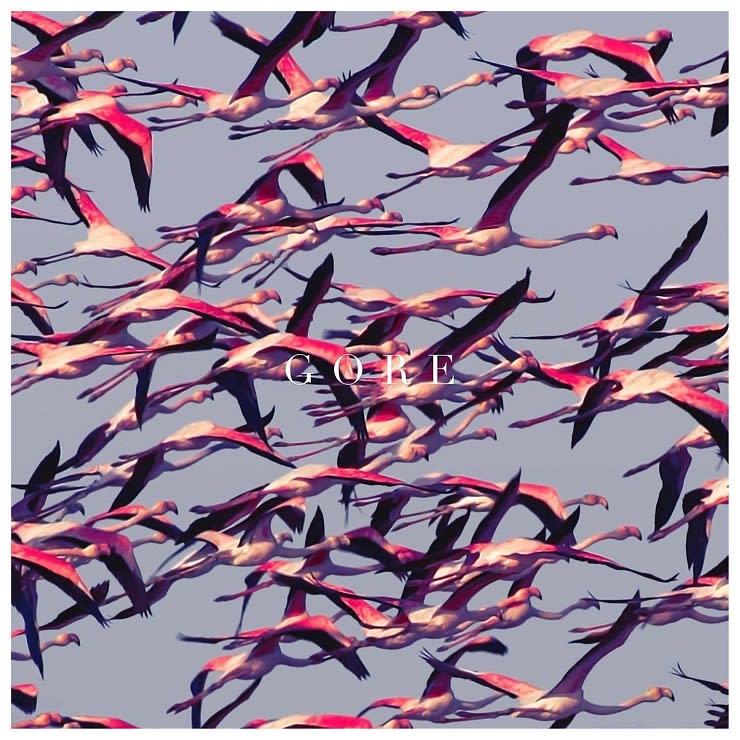Anyone who's written off Deftones as a '90s nostalgia act within the past decade is doing themselves a disservice. Though they still share stages with the likes of Incubus and other acts of their heyday, the Sacramento, CA crew are often the ones that outperform their counterparts both live and in studio. Gore, in following the beauty/brutality-straddling Diamond Eyes and Koi No Yokan, is no exception to this rule.
It's a musical dichotomy the band have been writing and playing with since their landmark LP White Pony, and one they've truly honed and mastered with their last two records. But unlike its predecessors, Gore isn't as quick to lean one way or the other. As frontman Chino Moreno said in an interview with Kerrang! from last year, it's not a happy record, but it's not an outright angry one, either.
Rather, it plays to both sides, at times within a matter of seconds: on opener "Prayers/Triangles," the pairing of Moreno's bleak lyrics and falsetto with Stephen Carpenter's echo-laden guitar is juxtaposed with triumphant, crashing chords; "Acid Hologram" largely rests in a major key before shifting to an unsettling minor; and "Geometric Headdress," while not one of the record's most memorable tracks, moves between screeching vocals and drummer Abe Cunningham's pounding tom work, rhythmically intricate verse sections and dreamier moments in an uptempo waltz.
Gore's truly stunning moments, both heavy and light, come with the record's longer, more developed offerings. "Hearts/Wires," another example of musical duality, employs Moreno's concise, ambiguous lyrical work (not unlike White Pony's "Change (In the House of Flies)") to drive its evocative nature, and though it's a slower track, the groove and songwriting of "(L)Mirl" make it stand out as the record's most cunning. Carpenter's wrecking ball riffs get the shine they deserve on "Doomed User" and the gleefully crushing title track, while the expressive "Rubicon" serves as the perfect capstone for the listening arc ("You cannot face the crowd all by yourself / Embrace the power we have / The record's ours to break / The more we build the crowd goes wild").
Though they may not become apparent until repeated listens, smaller details throughout the record are equally important to the band's playbook. Carpenter's playful riffing and Moreno's four-part harmonies in the back half of "Pitura Infamante," the final destructive seconds of the title track and a wonderfully phrased guitar solo from Alice in Chains axe man Jerry Cantrell in "Phantom Bride" are all highlights.
Continuing to age gracefully, Deftones deliver an emotionally divided release with Gore, one that will continue to endear and swing with your own mood — however you're feeling.
(Warner)It's a musical dichotomy the band have been writing and playing with since their landmark LP White Pony, and one they've truly honed and mastered with their last two records. But unlike its predecessors, Gore isn't as quick to lean one way or the other. As frontman Chino Moreno said in an interview with Kerrang! from last year, it's not a happy record, but it's not an outright angry one, either.
Rather, it plays to both sides, at times within a matter of seconds: on opener "Prayers/Triangles," the pairing of Moreno's bleak lyrics and falsetto with Stephen Carpenter's echo-laden guitar is juxtaposed with triumphant, crashing chords; "Acid Hologram" largely rests in a major key before shifting to an unsettling minor; and "Geometric Headdress," while not one of the record's most memorable tracks, moves between screeching vocals and drummer Abe Cunningham's pounding tom work, rhythmically intricate verse sections and dreamier moments in an uptempo waltz.
Gore's truly stunning moments, both heavy and light, come with the record's longer, more developed offerings. "Hearts/Wires," another example of musical duality, employs Moreno's concise, ambiguous lyrical work (not unlike White Pony's "Change (In the House of Flies)") to drive its evocative nature, and though it's a slower track, the groove and songwriting of "(L)Mirl" make it stand out as the record's most cunning. Carpenter's wrecking ball riffs get the shine they deserve on "Doomed User" and the gleefully crushing title track, while the expressive "Rubicon" serves as the perfect capstone for the listening arc ("You cannot face the crowd all by yourself / Embrace the power we have / The record's ours to break / The more we build the crowd goes wild").
Though they may not become apparent until repeated listens, smaller details throughout the record are equally important to the band's playbook. Carpenter's playful riffing and Moreno's four-part harmonies in the back half of "Pitura Infamante," the final destructive seconds of the title track and a wonderfully phrased guitar solo from Alice in Chains axe man Jerry Cantrell in "Phantom Bride" are all highlights.
Continuing to age gracefully, Deftones deliver an emotionally divided release with Gore, one that will continue to endear and swing with your own mood — however you're feeling.
